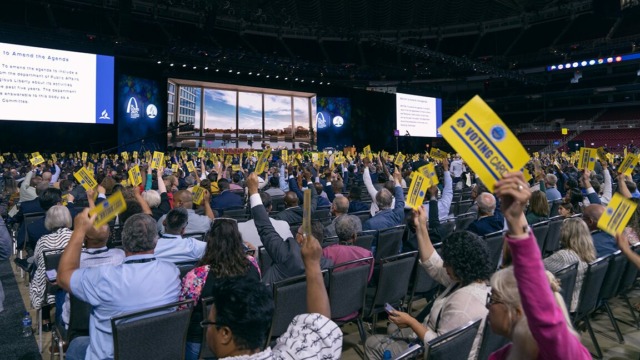For my first article on our conference’s aspirations for this term, please click here. And please remember, these aspirations are what we hope the sum total of the lives and ministries of our members, pastors, teachers, students, and institutions become as we continue to live for God and grow in our Savior, Christ Jesus.
In this installment, I want to speak briefly about the second aspiration in our list: “The message of God’s loving character, grace, and soon return is faithfully represented by our people to those around them.”
Though a thorough expanding on this aspiration could take numerous articles to flesh out, I’ll focus on a few specific things that come to mind with this aspiration.
Someone once wrote, “we are the expression on the face of God.” Though God has many ways of displaying Himself in this world (members in the Rocky Mountain Conference (RMC) are particularly blessed by the huge variety of ways He is revealed in the scenic beauty found here), He mostly relies on the image of Himself that is seen in the lives of His people. So, a fair question to ask would be, “what does the world think of God when they look at us?”
Perhaps, like me, you have noticed the number and frequency of articles in the news lately about why people are leaving their church. This has always been a problem, but the rise a couple of decades ago of postmodernism has cut deeply into the church’s ability to be relevant and provide meaningful ministry.
Postmodernism has made truth relevant (or rather, tried to!). That is to say, I am free to determine what is truth for me even if my truth is not the same as your truth. Gone seems to be the notion of objective truth—that thing we can all lean against to ground us and help us keep our bearings in life.
Caught in the wake of postmodernism is the diminution of the authority of Scripture as the source of truth. In prior years, for example, when we would do evangelism, we’d be arguing with other people about what was truth and how to live it from the Bible. We may have disagreed about what the truth was, but we had no disagreement about the authority of the Book from which we debated. Today, the Scriptures are considered only as a source of authority, not the source of it. The postmodern worlds say, “You can choose if it’s an authority for you, but you can’t choose to have it be an authority for someone else if they don’t want it to be.”
Do you see the conundrum this creates for the church? One of the reasons often stated in those articles I mentioned earlier about why people are leaving the church, is that the Bible and churches are no longer relevant to our contemporary world. Particularly in the realm of social issues, many have come to feel that the Bible lags behind where society is now. Of course, that means that the thinking has shifted to be “how can we find permission in Scripture to live as we wish now?” rather than asking, “how can we live now in light of what we know the Scripture teaches?”
In my own observations of life today, I see more angst, anxiety, fear, depression, fear, and anger than ever before. As a Bible-believing Christian, it seems clear to me that the rise in these emotions is directly related to a general walking away from Christian values and truth on the part of society. Relegating the principles of Scripture to the dustbin of history has left the world without its true rudder. No wonder we live in angst.
And the only real counter to this is the changed life lived in the face of it all.
You can argue over the details and even doctrine, but it’s harder to argue with someone who has peace and assurance in spite of all the reasons out there to be anxious, fearful, or angry. That’s precisely the Christian’s opening to live a life that shows that God’s loving character matters, that grace matters, and that an ultimate end to the reign of sin and sinfulness matters.
My aspiration for this aspiration is that our people will be a walking, breathing, speaking beacon of hope because we believe that God is who He says He is, and that we stand in faithful contrast to what we see happening in this age. And by His grace, may we all live to see His soon return!
—Mic Thurber is RMC president




